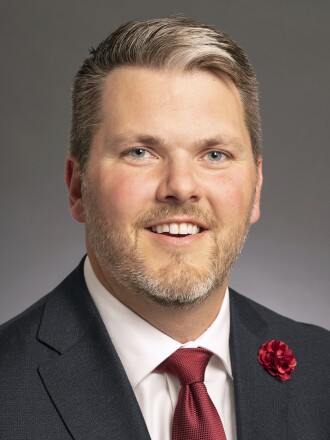ST. PAUL ŌĆö As Minnesota lawmakers work through budget negotiations, the pressure to pass a bonding bill remains after the 2024 session failed to deliver one.
Outside of a meeting between the four leaders of the Minnesota Legislature on Thursday, April 10, lawmakers confirmed that they have started negotiations for a bonding bill.
ADVERTISEMENT
A ŌĆ£bonding billŌĆØ refers to legislation that allows the state to borrow money by issuing bonds to fund public infrastructure projects. Bonding bills require a 60% super majority vote, a higher threshold than the simple majority needed for most bills in the Minnesota Legislature.
Bonding bills can be passed per session and are separate from the budget.
Senate Democrats said Thursday that theyŌĆÖre considering $1.35 billion for a 2025 bonding bill and $0 in 2026. Leader Melissa Hortman, DFL-Brooklyn Park, said the House doesn't have an official target to share but that the chamber is working off of Minnesota Management and Budget recommendations. MMB officials said at the February forecast review that the state could take on a roughly $700 million bonding bill for the 2025 session and $1 billion in 2026.

The 2024 session in delivering a bonding bill, which passed the House but stalled in the Senate. The Legislature passed its last bonding bill in 2023 when it for infrastructure projects across the state. The next most recent bonding bill was passed in 2021.
Sen. Sandra Pappas, DFL-St. Paul, who chairs the Capitol Investment Committee, said passing a bonding bill is key this year to ŌĆ£keep up with all the deferred maintenance.ŌĆØ

ŌĆ£Last year would have gotten us back on track, but we just canŌĆÖt go two years without a bonding bill,ŌĆØ Pappas said. ŌĆ£While being on track is nice, itŌĆÖs not as important as really funding those projects.ŌĆØ
In January, Gov. Tim Walz proposed an His proposal includes roughly $239 million for public safety projects, $206 million for Minnesota State and University of Minnesota building renovations and repairs, $144 million in water and transportation infrastructure, $10 million for work on the Rapidan Dam in Mankato and $7 million for public housing. Walz has not announced a 2026 bonding bill proposal.
ADVERTISEMENT

Senate Minority Leader Mark Johnson, R-East Grand Forks, said ThursdayŌĆÖs meeting with the governor and his Democratic counterparts was the beginning of bonding conversations but that he remains hopeful of meeting end-of-session deadlines.

ŌĆ£Not a lot of progress, but an opportunity to just kind of start building those bridges and lay out the platform,ŌĆØ he said. ŌĆ£I keep hearing people talk about the June special session and things like that, but as of right now, things are looking actually pretty promising to get to that May 19 deadline.ŌĆØ
After Senate Democrats announced their $1.35 billion target, Sen. Karin Housley, R-Stillwater, vice chair of the Capital Investment committee, said the Senate shouldnŌĆÖt be ŌĆ£borrowing as much money as we can.ŌĆØ
ŌĆ£Working together will be crucial to avoid trying to beat the clock at the end of session,ŌĆØ she said. ŌĆ£Rather than borrowing as much as we can, we should make sure that every dollar borrowed is well-spent on the most important and necessary projects.ŌĆØ
What are labor unions and cities saying?
Bradley Peterson, with the coalition of Greater Minnesota Cities, said at an April 3 press conference on bonding bills that there is demand for water treatment projects across the state, specifically those targeting phosphorus, manganese and forever chemicals.
A 2023 study by the Minnesota Pollution Control Agency said it would to remove and destroy per- and polyfluoroalkyl substances (PFAS) from wastewater streams across that state.
ŌĆ£The bonding bill is not dessert,ŌĆØ Peterson said. ŌĆ£It is the table setting. It is the table setting for clean drinking water, fishable water, swimmable water.ŌĆØ
ADVERTISEMENT
Rob Busch, a carpenter and lead business representative for the North Central States Regional Council of Carpenters, said Minnesota communities are struggling to undertake critical projects because of funding limitations.
Dan Olson, business manager for LaborersŌĆÖ International Union of North America Local 1091, said local jobs are affected when local projects are hindered.
ŌĆ£You legislators need to do better. We need our laborers to go to work,ŌĆØ he said.












